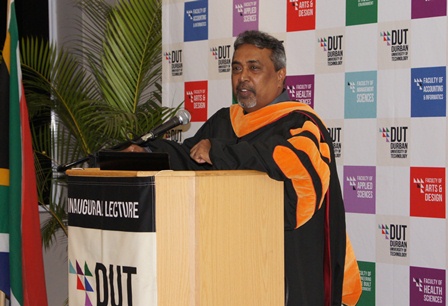Every day is a learning curve for Professor Krishnan Kanny, who is passionate about designing, managing engineering projects and testing the projects’ reliability and logistics; all forming part and parcel of what he does best which is his passion for research and innovation.
Sharing his love of science and giving an account of his life’s work was the aim of his inaugural lecture: Are we going naNo ballistic or do we have a good story to tell? Prof Kanny delivered his inaugural lecture yesterday (21 May 2014) at the DUT Hotel School Conference Centre, Ritson Campus, at 18h30.
DUT academics, business stakeholders, family members, students and friends all attended the inaugural lecture where Prof Kanny’s academic success and achievements as a scientist were celebrated. Paying tribute to him at the event was DUT Vice-Chancellor and Principal Prof Ahmed Bawa, who said that inaugural lectures an important milestone in the life of outstanding academics like Prof Kanny and a wonderful celebration of their ascension to full professorship at the University.
“This form of recognition is one important element of a multilayered social contract between professor and university, professor and society and university and society; that the University fosters the unfettered creation of new knowledge under conditions of academic freedom. We must depend on our professor to be the kernel of our institution and lead the way in producing research of the highest quality amongst our students and global, high impact journals,” he said.
Spending most of his time in his research lab; designing, processing, and testing composite materials systems has been Prof Kanny’s passion which just also happens to be his job as a scientist and researcher in advanced engineering materials. Professor Kanny has more than 20 years research experience in advanced engineering materials systems. He has extensive experience in mechanical engineering product, process and system design including development, implementation and commissioning.
Prof Kanny holds numerous postgraduate degrees such as M.Sc, Mechanical Engineering (UKZN) and a PhD in Materials Science and Engineering (TU, Alabama, USA). He is a Professor in the Department of Mechanical Engineering at DUT and currently heads the naNO Composites Research Group (nCRG). The nCRG is one of very few groups in the country that has capability in the trinity of design, materials and processing. More recently, Prof Kanny has been processing and testing nano¬infused structures for the aerospace, naval, and mass transit systems.
Speaking at his inaugural lecture, Prof Kanny thanked all who had attended the event, in particular his former teacher from Chatsworth, Dr Juggie Govender, who was instrumental in instilling his love and passion for Maths and Science. He shared information regarding what he and his team are currently working on as well as future projects especially with regards to composite and bio composite materials systems.
“We can improve the efficiencies of batteries, fuel cells and solar panels. We can also solve problems relating to drug delivery, make better prosthetics and medical diagnostic equipment and improve the efficiency of every day consumer products. So nanotechnolgy is an important part of our research and is set to transform and revolutionise multiple technologies,” he said.
He also spoke about a project which entails the possibility of building a pedestrian bridge at DUT, as traffic is a problem. The bridge could be assembled overnight without causing any traffic congestion. He also touched on the shortage of student housing and spoke of another project in the pipeline which tackles this issue.
“Buliding composite capsule type houses is a possibility, we do have all the infrastructure. These capsule type houses are designed to slide and fit into a vacant football field; a project which many stakeholders are interested in,” said Prof Kanny.
Prof Kanny also predicted that in the next 10-20 years, there will be superfast information highways, faster internet, better banking and solar energy at least 50 times faster and more efficient.
“Aircrafts should also be 50 percent lighter. We will have batteries that charge quicker, store more (energy), last longer and are less expensive. Just imagine, we will also have virtual printers, phones and computer displays that bend and fold. And even the potential to make people and things completely visible. So, in the next thirty years, we shall have plenty of water, cheap and abundant energy and a much cleaner environment. All this is possible with research, hard work and dedication and that is the aim and work of the students who are always researching to find innovative ways of making products more efficient for the future,” he said.
Recently, Prof Kanny has been processing and testing nano¬infused structures for the aerospace, naval and mass transit systems. Prof Kanny, whose work is recognised internationally, has more than 100 papers that have been published in international high impact factor journals and conference proceedings in the last ten years. He has presented his work at conferences across the globe. Professor Kanny continues to network with numerous national and international scientists from the United States, Canada, India, Argentina, Italy, Germany, Australia, New Zealand, Brazil, India and China.
He received the VC’s Research Award in 20I0 and the Top Faculty Researcher’s Award for the last three years.
– Waheeda Peters
Pictured: Prof Krishnan Kanny gives an account of research-work being undertaken by his students at the naNO Composites Research Group (nCRG). Prof Kanny was speaking at his inaugural lecture last night (May 21, 2014).

